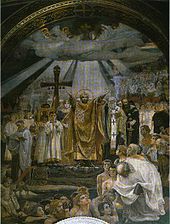Unilineality
| Part of a series on the |
| Anthropology of kinship |
|---|
 |
|
Social anthropology Cultural anthropology |
Unilineality is a system of determining descent groups in which one belongs to one's father's or mother's line, whereby one's descent is traced either exclusively through male ancestors (patriline), or exclusively through female ancestors (matriline). Both patrilineality and matrilineality are types of unilineal descent. The main types of the unilineal descent groups are lineages and clans.
A lineage is a unilineal descent group that can demonstrate their common descent from a known apical ancestor.
Unilineal descent organization and deep Christianization

Recent research on the unilineal descent organization and deep Christianization studies variables that are usually regarded as the main causes of the decline of unilineal descent organization (statehood, class stratification and commercialization), along with a variable that was never regarded as such a cause before — deep Christianization. It demonstrates that the traditionally accepted causes of the decline of unilineal descent organization (statehood, class stratification, commercialization) are less significant than deep Christianization. It also shows that the presence of unilineal descent groups correlates negatively with communal democracy and is especially strong for complex traditional societies. This research concludes that, because the communal democracy correlates positively with the supracommunal one, the Christianization of Europe might have contributed to the development of modern democracy by helping to destroy unilineal descent organization in this region.[1]
